Here are some of the bikes from the Pedal Nation Bicycle Show that caught my eye…
Below is the Proletariat from Stop Cycles. Stop Cycles is a new brand of urban bikes from the mountain bike and downhill specialists at OneGhost Industries. The bikes are designed in Portland by David Meredith (who also works at Bike Gallery in Lake Oswego) and made in Taiwan. This model is an “aggressive commuter” with belt drive, internal hub, flat bars and dual discs:
Retail price is $779 for frame/fork and belt drive kit. You can find Stop Cycles at Joe Bike (3953 SE Hawthorne Blvd).
North Portland resident Alan Gunn had one of the baddest entries into the Pimp’d Bike contest. His highly customized Surly Pugsley has a lot of nifty touches including homemade coroplast fenders and an Old Man Mountain rear rack. The most amazing thing about this bike are the lights Alan made himself. He spent hours roving obscure web forums to figure out how to make them and they came out gorgeous:
This is the Orange Dream Cycle. It was built up by Tom Daly from WTF Bikes for Roger Mallette (owner of Retro apparel). A great mix of old and new, it’s got a classic steel lugged frame with the NuVinci N360 hub and wooden fenders from Portland-based Sykes:
Early Rider is a London-based company that makes wooden balance bikes for the little ones. Balance bikes are all-the-rage these days and Early Rider is looking to expand into North America. The owners are friends with with Nutcase Helmets owner Michael Morrow and the two companies partnered up on the Nutty Riders Zone at the show. Take a look at the Early Rider:
The Oregon Bicycle Constructors Association (OBCA) had a joint space with several members represented. Here are a few of them:
The Trucker Trike is the latest from Portland designer Bill Stites. Stites has long specialized in quad-cycles and this is his most ambitious project yet. It’s electric-assisted, built like a tank, and made from the ground up to be a viable hauler that can carry up to 800 pounds of freight. The first one is already sold to B-line PDX, a local pedal-powered delivery company. Stay tuned for a full report next week:
And last but not least, check out the TriPod from Columbia Cycle Works. This Portland-based company just launched a few months ago and they’ve really come up with something special. Owner Phil Rush says he was inspired by Al Gore’s Inconvenient Truth and figured that more people would ride if they could enjoy the comfort of an enclosed vehicle.
As you can see, there was quite an interesting range of bikes at this show. Definitely not your average bike show (or your average bike city for that matter).
— The Pedal Nation Bike Show is open from 10am – 5pm on Sunday (4/11). See more coverage of the show here.





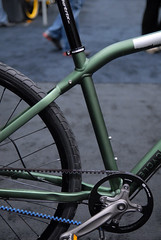


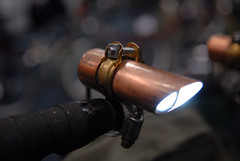



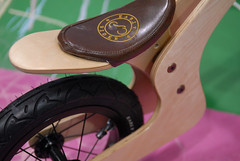

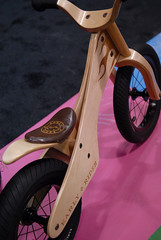





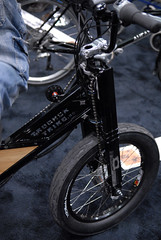



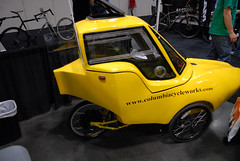




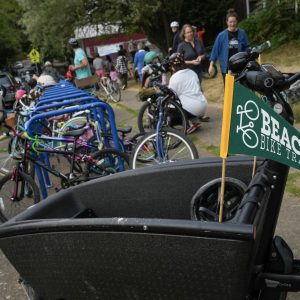
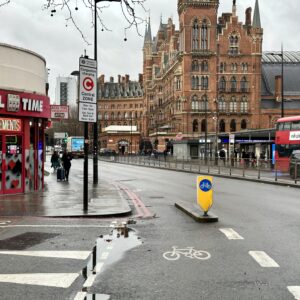
Thanks for reading.
BikePortland has served this community with independent community journalism since 2005. We rely on subscriptions from readers like you to survive. Your financial support is vital in keeping this valuable resource alive and well.
Please subscribe today to strengthen and expand our work.
Although there were some nice bikes to see, I was a bit disappointed with show. For being a “bike show”, there wasnt a whole lot of bikes. I think the bike corral out front had more than the show. A true let down for driving an hour to attend. (glad I didnt ride that far).
The Love Machine cruiser looks like the MDC 29er frame we are making (only ours is a full on Klunker throwback mountain bike)! Love the lines on it!
Thanks for the coverage and mention also!
Cheers to Joe Bike (for the display) and Bike Portland (for the coverage and awesome pics).
Joe will have more Proletariat for sale and all our other bikes starting in May!
I’m going later today. Thanks for the preview!
Wow, I hate to say it, but it’s actually cheaper and more practical to buy a CAR than it is for some of these $2000 “utility” bikes. Think about it, buy a clunker car for $600, drive it the one time a week you need to haul something heavy and awkward, putting low mileage on it, using probably only $5-10 in gas week, and $50 a month for insurance. Now, theoretically, after one year of owning the car it becomes more expensive than a cargo bike, but with the HUGE difference of being able to quickly and practically go 20 miles between destinations and carry heavy objects and multiple people.
I know, this talk is blasphemy on the bike scene, but not everyone is a dot.commer with fluffy salary and a work at home schedule. Most people if forced to choose between a $2000 bike and $2000 car for utility purposes are choosing the car for the above reasons. SO, I’m not sure all the back patting is in order for luxury cargo cycles saving the world. Most of the time I see them, they are just pulling along kids or pizzas to be delivered 1 mile away.
solid gold:
That is something that has crossed my mind as well, not so much with cargo bikes, but with all the fancy “urban city” bikes.
I think what we are seeing is the movement of bike culture towards being mare acceptable and “mainstream” here in America, where bike companies CAN make money selling a $1,500 bike to someone in the 40’s who just wants to ride from their condo to the grocery store and back. It’s no longer only racers in their spandex and carbon fiber bikes and young Portlanders or “eco people” on their used/fixed up/modified bikes.
I don’t think it’s really a sign of any larger trend or unfriendliness towards people who can’t afford them, I just simply think there is an increased demand these days from a market segment that can afford those types of bikes.
Proletariat: B-, kudos for belt drive and internal gears. Fail for cost.
Coroplast fenders: B. Been there, dun dat.
Trucker Trike: C+, kudos for originality. Fail for over-engineering and cost.
TriPod: C, kudos for trying. Fail for looking like a car. Design didn’t generate that must-have “heat.” The lime green thing looks 18th Century.
A.K. (#7), I tend to agree, but the unfortunate thing is that “local” is almost always going to mean “more expensive.” All this innovation and experimentation is cool enough; all the local builders and designers and now builder schools and assorted local accessories that go along with all this is all well and good, but it doesn’t really add up to much in terms of market penetration or shifting the transportation zeitgeist away from the automobile. When I put on my consumer hat, at this point I’ve conditioned myself that when I hear “local” I think “I probably can’t afford it,” which doesn’t bode well for sustainability or our ability to make/grow/build anything for anyone without a trust fund. That holds especially true for anything bicycling-related.
Maybe that kind of thing will start to change, maybe it won’t. I can’t glean too much from looking at Stop Cycles website, no doubt because I’m not sufficiently bikegeeky (though I am geeky enough to be put off by “Made on a Mac” at the bottom of every webpage). I still can’t figure out what “aggressive commuter” means.
I attended on Saturday. I also wish there were more bike companies there. But, overall it was fun!
I think Paul has missed the mark with his critique of the Tripod.
It’s a velomobile. If you look on their site it costs $3800 and includes an electric motor (but not batteries) Considering almost all velomobiles (car replacements) consider ~$7500 and up this is a very attractive product. See http://www.bluevelo.com for what velomobiles cost.
Their is a sizable # of potential bikers who are leery of riding in the rain and/or heavy traffic and the Tripod’s shell offers some protection physically … more importantly it may help psychologically get more riders out on the streets. Plus no balance is required.
Ouch Michael M, we are bike designers and advocates (life long, literally over 20 years doing this), not web designers. iWeb is easy for us after spending months behind IronCAD and SOLIDworks!
Fail for price? seriously? I challenge you to make a bike with those features and quality and be able to retail them for a cost that is less than ours AND still have enough money left for a value meal, let alone enough to support yourself and a family with!
I like the one that I built.
The other ones are rad, too.
Hi solid gold,
That’s a good point. Although I think it would be cheapest to rent the car using one of the car sharing services. Maybe we need something similar for cargo bikes or trailers.
Another thought, if you get a cargo bike using a bike loan and pay it off over the course of a year or two, you still save money over the car and avoid the initial expense. Cargo bikes also maintain their value pretty well.
My hope is that the great ideas in these home built machines will trickle down to affordable bikes in the same way that the custom long tails led to the $600 mundo.
Ed
Michael M.:
For sure, locally built bicycles are going to probably going to be expensive for the foreseeable future, since they have to be hand-crafted by someone who is paid a (hopefully) livable American wage.
I know next to nothing about the bike manufacturing business, so I can’t really comment with any insight regarding the cost of building a bike by hand, etc. I can only imagine it is somewhat expensive, and you can’t compete with the Asian factories that crank out frames by the thousands.
What will be interesting is to see the used market for these utility, “urban”, and cargo bikes pop up as people who bought them no longer use them, only use them once and garage them, etc. I wonder how long that will take?
Biking continues to gain momentum as something popular and cool… I wonder how much of that will stick with people getting into cycling at an older age or because they can easily afford a very nice bike, but have not previously been into cycling.
Wow, the first paragraph of my post is rather hard to read, sorry. Not enough coffee yet this morning to proof read properly!
Alan’s Surly build looks like a great ride for the upcoming Apocalypse. ++
Stop Cycles (#12), not to sidetrack the discussion, but you could save a lot of money and support local, sustainable business/non-profits by ditching the Macs and outfitting your shop with rigs Linux rigs from Free Geek’s store. Just a thought. 🙂
I wasn’t the one who said your bikes are too expensive — actually, what appeals to me about the notion of locally designed but foreign-built bikes is that they are probably the best bet for bridging the divide between the high-end handmade bikes that will almost definitely remain out-of-reach for the majority and the mass-produced bikes of variable quality that currently dominate the market. Much has been made by Jonathan and others, even in city government, of Portland’s supposedly burgeoning bike business economy (partly separate from opportunities for pushing bike tourism), but that business focus has been almost exclusively on the luxury end of the market. The same week BikePortland published an article extolling the opportunities for bikey retail in South Waterfront, the city announced the cancellation of 400 low-income housing units that SoWa TIF dollars were supposed to fund. That, apparently, is what “urban renewal” really means. The trajectory of Portland urban development has been continuously to push poorer, low- or fixed-income residents farther out to the margins of the city, if not out of the city altogether. It looks like bicycling, unfortunately, is part of the trajectory.
My only dubiousness about your bikes is that I can’t figure out what half of it means, but that’s just because I’m not a particularly well educated consumer when it comes to bike terminology. I don’t know what “135mm dropout spacing” means or whether it’s something I should prize. You’re obviously aiming, at least at this point, for a much more sophisticated rider, which (again) is all well and good. It just doesn’t fill me with confidence that all this local economic activity is going to amount to more than a blip.
Solid (#6) its better to compare a new bike to a new car (in which case these cargo bikes make more sense). In five or ten years there will presumably be enough old cargo bikes around to make a substantial market of used cargo bikes. Then you can compare the prices of one of those to a clunker car 🙂
Michael (#18) I just finished reading a book about the history of the Brompton folding bike. They considered moving production overseas but found that the disadvantages (harder to control quality and fine tune the design over time) outweighed the cost advantages.
In 2009 they built 20,000 bikes in their London factory – so you can clearly scale niche bike products in the West if you do it right. (And cargo bikes are going to be niche for awhile I’d think – but would love to be proved wrong there 🙂